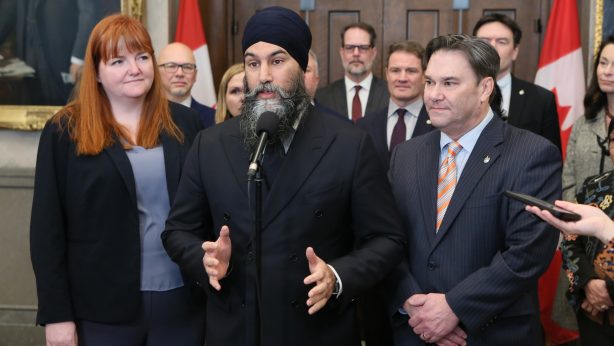Economic and Fiscal Update 2021 overlooks affordability and pharmacare
The federal government released its Economic and Fiscal Update 2021 this week, but the rapidly spreading Omicron variant of COVID-19 stole the show. Finance Minister Chrystia Freeland (University—Rosedale) had to deliver her speech from an isolated location after two of her staff tested positive for COVID-19.
Later, Minister Freeland told journalists the danger posed by the Omicron variant prompted the Finance Department to budget $4.5 Billion to respond to the threat, including billions for rapid tests, therapeutics and treatments, and further income supports in case of shut-downs caused by Omicron outbreaks.
“We are spending a lot of money on health care. We are trusting the provinces to use these tools to fight COVID.”
FINANCE MINISTER CHRYSTIA FREELAND
But absent from the update was any commitment for universal, single-payer pharmacare, as the Canadian Health Coalition (CHC) and 20 other organizations and experts sought in their joint letter to the Prime Minister and key Ministers last week. “The Economic and Fiscal Update and Budget 2022 are opportunities to demonstrate in a concrete way that the Liberal government will keep its promise on pharmacare,” said the December 7, 2021 letter signed by the CHC and groups representing nurses, doctors, unions, community health centres, and many others.
NDP Finance Critic Daniel Blaikie (Elmwood—Transcona) said including pharmacare would help Canadians address affordability issues. “When we talk about affordability, what is one of the biggest cost pressures for Canada’s seniors? It is the price of prescription drugs. The Liberals promised an answer to that as long ago as 1997,” he said, committing his party to continue to press the government for a drug coverage program.
Budget 2022
Some commentators suggested broader, non-pandemic-related health care spending programs, such as those promised in the recent Liberal election platform, will likely be delayed until Budget 2022.
But waiting for the spring was unsatisfactory for the Bloc Quebecois, which has been taking up calls from Quebec Premier Legault and other premiers for unconditional funding increases to the Canada Health Transfer (CHT) of $28 Billion with an annual 6% escalator. Kristina Michaud MP (Avignon—La Mitis—Matane—Matapédia) asked Freeland in the House of Commons, “Why, then, is the minister proposing that the Canada health transfer escalator be maintained at 3%, the legal minimum, until 2027, when that is far below the annual increase in health care costs?”
Minister Freeland rejected the argument that the federal government is not helping provinces enough, saying, “As I pointed out in the economic statement, $8 out of every $10 spent by all levels of government in Canada [for pandemic measures] came from the federal government,” she replied.
Health Coalition seeks targeted health care funding
The Canadian Health Coalition has warned the federal government against giving unconditional health care spending boosts to provinces because there are no guarantees the additional money will actually be used for health care.
Once the federal cheque is cashed, provinces are free to spend the money any way they wish, including decreasing their share of health care spending, building highways, buying pipelines, and cutting corporate taxes.
Even the new $4.5 billion in health care spending promised to the provinces in the Economic and Fiscal update is largely unconditional, despite being earmarked for dealing with Omicron. “We are spending a lot of money on healthcare. We are trusting the provinces to use these tools to fight COVID,” Chrystia Freeland told CTV’s Evan Soloman.
The need for accountability is one more argument for conditional health care spending within a Canada-wide pharmacare program is a good idea. It will reduce burdensome drug costs and provide immediate relief for families while ensuring federal funds actually benefit people in the way it is intended. Budget 2022 is the next, best opportunity to fulfill the government’s long-promised national universal single-payer pharmacare program.


